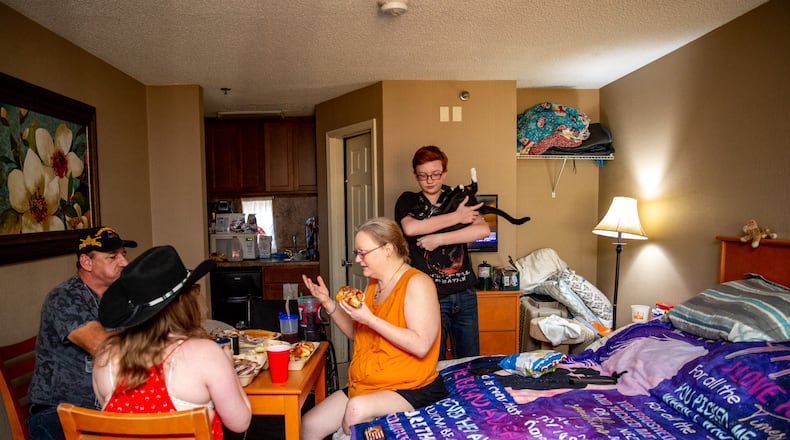Court filings to oust renters behind on their payments slowed in metro Atlanta after pandemic-inspired eviction bans were put in place, but some housing experts worry a deluge could be coming if a federal moratorium is lifted next month.
Between last April and the middle of this month, 74,454 evictions had been filed in five Atlanta counties, according to the Atlanta Regional Commission. But many more tenants owe back rent. Estimates range from 184,000 to 353,452 Georgians and 5.7 million to 7 million Americans.
That has Margaret Kinnear, a senior attorney at Atlanta Legal Aid, concerned about a spike in evictions when the current ban expires on July 31. “All along, the moratorium felt more like a Band-Aid on a crack in the Hoover Dam,” she said.
No time is a good time to be kicked out of a home, but now is especially bad, said Georgia Tech assistant professor Elora Raymond, the lead author on a recent Federal Reserve Bank of Atlanta study on evictions.
“Unless we can get the vaccination rate up and get the case and hospital rates down, it will not be safe to go to homeless shelters and double up with relatives,” Raymond said.
Nationally, eviction filings have been around 50% below average during the pandemic, Princeton University’s Eviction Lab statistics show. Still, women and racial minorities are disproportionately more likely to face legal proceedings for nonpayment of rent, according to the organization.
“This crisis, like many others, is amplifying existing inequalities and exacerbating the racial divides in our society,” Raymond said.
Throughout much of the pandemic, there have been federal restrictions on evictions for nonpayment, first from the federal CARES Act and then from the Centers for Disease Control and Prevention. The CDC moratorium was extended on Thursday — likely for the final time, said CDC Director Rochelle Walensky. A federal appellate court ruled in May that the CDC overstepped its authority with the moratorium; the decision was put on hold and later appealed successfully.
The CARES Act moratorium ran from the end of March 2020 to the end of last July. The CDC’s prohibition on evictions started up in September. During the one-month lapse, eviction filings roughly tripled in the five metro Atlanta counties from the Fed study.
The latest extension was met with mixed feelings.
The one-month moratorium “will be very useful because it will allow more time for emergency rental assistance to get to renters,” said Emily Lemmerman, an Eviction Lab research specialist. “That might mitigate the number of eviction filings once the moratorium is lifted.”
Rick Stolz, a landlord who owns 18 properties in Atlanta, has a different perspective.
“I thank the CDC for not extending another 90 days,” he said. “I’m smiling because maybe (property owners) will see an end to this nonsense.”
Eviction safety net has not caught all
Lemmerman noted that Georgia and other states that don’t have their own moratoriums have seen higher percentages of eviction filings than states with added protections.
Part of the reason why nonpayment filings in Georgia have not stopped is because counties have different interpretations of when evictions can proceed. In Cobb County, during much of the CDC moratorium, the magistrate court chose to forego scheduling proceedings for nonpayment of rent in an effort to prevent wrongful evictions. But Cobb started hearing cases again earlier this year. In Fulton County, all eviction cases have proceeded since July. Although many cases have been adjudicated in Atlanta, actual evictions often have been delayed due to the moratorium.
The CDC moratorium requires tenants to file paperwork with the agency to prevent eviction for nonpayment. Tenants are eligible for protection if they show their income levels decreased during the pandemic.
“I sent out an email to all of my tenants and said, ‘Under the CDC guidelines, this is what you have to do if you have been affected by COVID-19,’” said Krista Wright, who manages well over 100 properties. “I had two tenants that filed the CDC declaration but didn’t follow the rest of the instructions. Both have been evicted since April.”
Wright has evicted around a dozen tenants during the pandemic — an unusually high number for her.
Credit: Alyssa Pointer/Alyssa.Pointer@ajc.com
Credit: Alyssa Pointer/Alyssa.Pointer@ajc.com
“It has been extremely frustrating because the people who need the help are grateful and the people who don’t have just taken advantage,” Wright said.
More than one of Wright’s property owners have lost more than $10,000 during the pandemic.
Steve Philips, who owns less than 10 rental properties, knew that a CDC form existed but has not seen it. Even so, he’s made payment plans with all of his tenants. One has been evicted during the pandemic.
“The tenant was taking advantage of how I had no recourse,” Philips said, adding that he had various reasons to believe she had money to pay rent. “I had to learn to work with them because I had no other choice.”
He said that, after working out a reduced payment plan and offering the tenant money to vacate the property, he finally filed eviction papers in March and evicted her in May. Philips said he lost eight months’ worth of rent in that case and had to borrow money to continue upkeep on his properties.
Landlords can make a portion of the losses back when they file their taxes.
As for tenants, many do not know how to take advantage of the moratorium.
Crystal Perdue said she was unaware of the CDC form. So, for the first time in her life, she and her family were evicted.
Credit: Jenni Girtman
Credit: Jenni Girtman
Perdue, who lived in Duluth, is disabled and suffers from diabetes; she lives with her husband, a veteran, and their two children. In February, she contracted COVID-19 and her husband’s employer told him to stay home until everyone in his family tested negative. Without any income that month, they could not pay rent and the property manager filed for eviction.
“We got no warning other than the original eviction (notice),” she said. “On May 28, sheriffs showed up at our door and took all of our stuff out and threw it on the sidewalk.” She said that the family did not file an answer to the eviction notice in court, which automatically triggers an eviction. But, she added, the property owners knew her family had requested rental assistance.
Her family has been living at the Whits Inn in Loganville since and has yet to receive rental assistance.
Tierra Harris, a disabled veteran, is in the process of being evicted. In December, she moved into a new apartment, only to find that it was uninhabitable due to mold and half-finished renovations. After spending the winter bouncing around, she was relocated to a new apartment in the same complex. But she said she was charged for six months at the old apartment on top of the higher rent at the new place. She couldn’t afford to pay.
She said she received an eviction notice past the deadline for submitting an answer. Harris added that she has struggled to get rental assistance because her VA benefits disqualify her from many forms of financial aid.
“The qualifications that they have (in Georgia) are so tight knit to the point where it is like, ‘Do you plan on helping anybody?’” Harris said. “I am at a disadvantage with everything; damned if I do, damned if I don’t.”
Harris does not know where she will go.
Eviction backlog “unprecedented”
Once the moratorium is lifted, all non-payment evictions can be filed and all evictions will proceed. Typically, the eviction process takes a few weeks in Georgia.
With heavy court backlogs, it is not clear how fast or slow the eviction process will move in metro Atlanta. Some landlords expect there will be months of delay, while a Fed representative said the “unprecedented” backlog makes it hard to predict.
According to Raymond from Georgia Tech, Georgia is one of “the most permissive in the country” when it comes to eviction.
If tenants have evictions on their records, many landlords will not rent to them.
Various studies show that eviction makes the threat of COVID-19 even worse.
Although he is pleased as a landlord that the moratorium’s end date is potentially in sight, Stolz recognizes the weight of an eviction.
“The last thing I want to do is put a person on the street,” he said. “I would think any landlord would tell you that.”
More details:
- In Georgia, of those who are behind on rent, 18.4% believe they are very likely, 33.8% somewhat likely, 26% not very likely and 21.4% not at all likely to be evicted.
- It’s estimated there are 150,342 renter households in Georgia that are at risk of eviction.
Source: Zillow
Eviction filings, April 2020 through first two weeks of June
- five-county region: 74,454
- Clayton County: 10,879
- Cobb County: 10,293
- DeKalb County: 17,168
- Fulton County: 23,823
- Gwinnett County: 12,291
Source: Atlanta Regional Commission
About the Author
Keep Reading
The Latest
Featured




